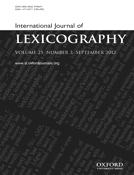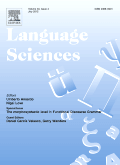
Lexikos
metrics 2024
Exploring the intersection of language and cognition.
Introduction
Lexikos is a distinguished academic journal in the field of linguistics and language studies, published by BURO VAN DIE WAT in South Africa. Since its establishment in 1991, Lexikos has maintained an open-access format, allowing researchers, professionals, and students unrestricted access to its valuable content. The journal operates under a comprehensive scope, emphasizing the intersection of language, linguistics, and cognitive studies, making it a vital resource for scholars in these fields. With an impressive Q2 ranking in the Linguistics and Language category for 2023, Lexikos is recognized for its rigorous peer-review process and high-quality publications, contributing significantly to both the Arts and Humanities and Social Sciences disciplines. Its Scopus ranking positions it favorably within the industry, showcasing its impact and relevance with 68th and 65th percentiles in respective categories. By fostering a platform for innovative research and interdisciplinary dialogue, Lexikos plays a crucial role in advancing knowledge and understanding in linguistics and language studies.
Metrics 2024
 0.22
0.22 0.90
0.90 0.70
0.70 19
19Metrics History
Rank 2024
Scopus
IF (Web Of Science)
JCI (Web Of Science)
Quartile History
Similar Journals

INTERNATIONAL JOURNAL OF LEXICOGRAPHY
Bridging Disciplines Through Language ExplorationINTERNATIONAL JOURNAL OF LEXICOGRAPHY is a leading scholarly platform in the domain of linguistics and language studies, published by Oxford University Press, a renowned publisher known for its contributions to academic excellence. With an ISSN of 0950-3846 and E-ISSN 1477-4577, the journal has established a robust international presence since its inception in 1988, converging its scholarly reach and insights for over three decades. The journal is highly regarded within its field, currently holding a prominent Q2 quartile ranking in Linguistics and Language and ranking #200 out of 1088 in the Scopus database within the Arts and Humanities domain, which places it in the 81st percentile of its category. Although the journal does not offer open access, it remains an invaluable resource for researchers, professionals, and students dedicated to advancing the study of lexicography. Key objectives of the journal include fostering innovative research, facilitating interdisciplinary dialogue, and providing a forum for the dissemination of significant findings contributing to lexicon development and language use worldwide. The INTERNATIONAL JOURNAL OF LEXICOGRAPHY serves as a vital conduit for scholarly discussions, ensuring that critical insights and discussions in lexicography continue to thrive in the academic landscape.

Journal of Language Evolution
Charting New Territories in Language DevelopmentThe Journal of Language Evolution, published by Oxford University Press, serves as a vital resource in the intersection of linguistics, psychology, and neuroscience. With an ISSN of 2058-4571, this prestigious journal has established itself as a prominent platform for innovative research since its inception in 2016, converging valuable insights up to 2023. It boasts notable rankings, including Q1 in Linguistics and Language and Q2 in both Developmental and Educational Psychology and Developmental Neuroscience, reflecting its high impact and relevance in the academic community. The journal is indexed in Scopus, where it ranks in the 93rd percentile for Linguistics and Language, showcasing its influence among leading scholars. Researchers, professionals, and students will find the journal’s rigorous analysis and interdisciplinary approach essential for advancing their understanding of language evolution and its broader implications. Although access is limited, the journal’s commitment to excellence positions it as a must-read for those engaged in these dynamic fields.

LINGUA NOSTRA
Cultivating scholarly discourse in linguistics.LINGUA NOSTRA, an esteemed journal published by CASA EDITRICE G C SANSONI SPA, has been a notable contributor to the field of linguistics since its inception in 1968. With an ISSN of 0024-3868, this journal is dedicated to advancing knowledge and research in linguistics and language studies. Despite its current Q4 category ranking in both the Linguistics and Language fields, and its Scopus ranking placing it in the lower percentiles, LINGUA NOSTRA remains a valuable resource for emerging and established scholars alike, offering insights into various linguistic phenomena. The journal publishes original research, reviews, and theoretical works that stimulate discourse in linguistic practices and methodologies. Based in Florence, Italy, this journal is not open access but continues to be a crucial platform for linguistic inquiry and findings, bridging historical and contemporary linguistic theories as it converges over the decades.

REVUE DE LINGUISTIQUE ROMANE
Deepening Understanding of Linguistic StructuresREVUE DE LINGUISTIQUE ROMANE, published by the esteemed SOCIÉTÉ LINGUISTIQUE ROMANE, is a prominent academic journal dedicated to the exploration of Romance linguistics. With its ISSN 0035-1458, the journal plays a significant role in advancing knowledge within the fields of linguistics and the history and philosophy of science. Although it does not currently offer Open Access, it provides critical insights and peer-reviewed research that are indispensable for scholars, educators, and students interested in the nuances of Romance languages. The journal, which has seen converged coverage from 2006 to 2017, and then again from 2019 to 2021, is ranked in the third quartile (Q3) across various categories within Scopus, reflecting its established presence in the academic community. As a vital resource for interdisciplinary studies, REVUE DE LINGUISTIQUE ROMANE is instrumental for those seeking to deepen their understanding of linguistic structures, cultural nuances, and the historical development of Romance languages.

Revista de Investigacion Linguistica
Innovating linguistic research since 1997.Revista de Investigacion Linguistica is a distinguished open-access journal dedicated to the exploration and advancement of linguistic research, published by the University of Murcia since its inception in 1997. With the ISSN 1139-1146 and E-ISSN 1989-4554, this journal serves as a vital resource for linguistics scholars and enthusiasts around the globe. Located in the vibrant city of Murcia, Spain, the journal aims to foster academic discourse by disseminating high-quality research that covers a broad spectrum of linguistic topics, including syntax, semantics, phonetics, and sociolinguistics. Its commitment to open access ensures that knowledge is freely available, promoting a wider reach and impact in the academic community. By contributing to the advancement of linguistic studies, the Revista de Investigacion Linguistica plays a crucial role in shaping contemporary linguistic theories and practices, making it an essential publication for researchers, professionals, and students alike.

Suvremena Lingvistika
Advancing Linguistic Research for a Global Audience.Suvremena Lingvistika is a distinguished open-access journal published by the Croatian Philological Society, dedicated to advancing research in the field of linguistics and language. Since its establishment, the journal has been pivotal in promoting scholarly dialogue within the linguistics community, especially among researchers and academics in Croatia and beyond. With an ISSN of 0586-0296 and an E-ISSN of 1847-117X, the journal has transitioned to an open-access model since 2007, ensuring that research is freely accessible to all. As of 2023, it holds a respectable Q3 ranking in the Linguistics and Language category, reflecting its potential contribution to the field. The journal's scope encompasses a wide array of linguistic disciplines, encouraging both theoretical and empirical studies. Supportive of new research, Suvremena Lingvistika aims to foster innovative approaches and methodologies in linguistics, making it an essential resource for students, researchers, and professionals eager to explore the complexities of language. With its ongoing publication until 2024, it continues to shape the linguistic landscape, providing valuable insights and fostering collaboration among scholars globally.

Mandenkan-Bulletin Semestriel d Etudes Linguistiques Mande
Fostering Knowledge in Mande Linguistic ResearchMandenkan-Bulletin Semestriel d'Etudes Linguistiques Mande is an esteemed academic journal dedicated to the exploration of Mande languages and linguistics, published by the Centre National de Recherche Scientifique in France. With its ISSN 0752-5443, this journal has established itself within the linguistic community, holding a notable Q3 ranking in both the Linguistics and Language category as well as respectable standings in Scopus ranks, placing it in the 55th percentile for language and linguistics. Since its inception in 2018, it has been pivotal in publishing groundbreaking research that advances our understanding of the Mande language family and its cultural implications. Although currently not open access, the journal offers a wealth of knowledge fostered through rigorous peer-reviewed articles aimed at linguists, researchers, and students alike, making significant contributions to the fields of linguistics and African studies.

Philologica Canariensia
Cultivating global perspectives in literary theory and linguistics.Philologica Canariensia is a distinguished academic journal published by the University of Las Palmas de Gran Canaria, focusing on the vibrant fields of Literature and Literary Theory as well as Linguistics and Language. With an impact factor that positions it in the Q1 and Q2 quartiles in its respective categories as of 2023, the journal has established itself as an important platform for scholarly communication and research. Since transitioning to Open Access in 2014, it has broadened its reach, allowing researchers, professionals, and students from around the globe to access high-quality publications without barriers. With a commendable presence in Scopus rankings, including a rank of #309 out of 1106 in Literature and Literary Theory, Philologica Canariensia aims to foster an interdisciplinary dialogue and advance knowledge in the humanities. The journal's commitment to publishing innovative research makes it an essential resource for anyone engaged in exploring linguistic and literary phenomena.

Studia z Filologii Polskiej i Slowianskiej
Fostering Dialogue in the World of Slavic StudiesStudia z Filologii Polskiej i Slowianskiej is a prominent journal published by the Polish Academy of Sciences, Institute of Slavic Studies, focusing on the rich and diverse field of linguistics and language studies, particularly within the Slavic context. With the ISSN 0081-7090 and E-ISSN 2392-2435, this open-access journal has been a valuable resource for researchers, professionals, and students since its transition to an open-access model in 2014. It features rigorous peer-reviewed articles that contribute to the understanding of linguistic phenomena and cultural narratives across Slavic languages. Recognized within the Q3 quartile of linguistics and language in 2023, it ranks at the intersection of arts, humanities, and social sciences, providing insights that echo through disciplines such as sociolinguistics, psycholinguistics, and philology. In its ongoing publication trajectory from 2011 to 2023, Studia z Filologii Polskiej i Slowianskiej continues to foster academic discourse and collaboration, positioning itself as a key player in the global linguistic community.

LANGUAGE SCIENCES
Bridging Disciplines in Language ResearchLANGUAGE SCIENCES, published by Elsevier Science Ltd, stands as a prominent journal in the field of linguistics and language studies. With an impressive impact factor that solidifies its reputation, it holds a Q1 ranking in both the linguistics and language categories for 2023, reflecting its excellence and relevance in cutting-edge research. Since its inception in 1979, this journal has evolved to encompass a wide range of interdisciplinary studies, providing a platform for innovative research that addresses the complexities of language use, acquisition, cognition, and social interactions. The journal is hosted in the United Kingdom and features rigorous peer-reviewed articles that contribute significantly to both the academic community and practical applications in language-related fields. With access options tailored for a diverse range of readers and contributors, LANGUAGE SCIENCES invites scholars, students, and professionals to engage with its comprehensive body of work and contribute to the ongoing discourse in linguistics.